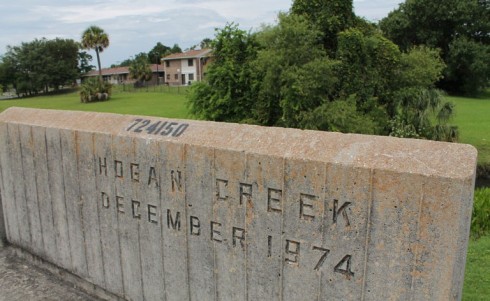
When I was sitting at a table waiting for my breakfast in Jacksonville, I was looking through some visitor guides, and the local weekly rags. As nerdy as it sounds, this is something that I don’t mind doing, because it kind of gives me a little feel of what kind of community I’m in, and occasional good ideas of things I could do, especially in areas where I have no idea of what to do.
It didn’t take long for me to realize that anything that looked remotely appealing to me, whether it was a show, an event, or a restaurant, always had the same conclusion: go to some place not in Jacksonville.
Whether it was one of the numerous beaches that are due east of the city of Jacksonville, or frequently otherwise St. Augustine which is supposedly 45 minutes south of Jacksonville, just about anything that seemed hip or interesting was outside of Jacksonville itself.
Then I started to think about the roads and sights of what brought me to the Uptown Cafe, and how I had to take one of the thousands of Martin Luther King, Jr. Boulevards in the country, and that I crossed a whole lot of scenery that would often be classified by most, including myself as simply “ghetto.”
Like so many cities across America, Jacksonville seems to be yet another one that has gone through a great white flight.
But it’s not like it’s an isolated incident, because it’s probably harder to find a city that hasn’t fallen victim to a great white flight. Off the top of my head of the places I’ve seen fairly recently, just about every single one of these cities has had a great white flight at some point. Atlanta, Detroit, Miami, Baltimore, Washington D.C.; these are cities that were historically “built by white men,” but then all of them left the cities to form suburbs and their own concentrated towns, only for the cities to be then majority populated by minorities, predominantly focused on black people.
Yeah, Jacksonville falls into that pattern as well. The white man didn’t seem to make nearly as much of a flight, as it changes pretty drastically by crossing one of three different bridges to outside of the downtown areas, but the point remains that when in downtown Jacksonville proper, there’s a noticeable cultural shift. Otherwise, I imagine it’s the beaches and St. Augustine in which the white man has fled to predominantly, considering that’s where they’re trying to goad tourists into going to.
But enough about Jacksonville, it got me thinking about great white flights just in general. It happens to a ton of cities, and the same kind of patterns pop up. Suburban towns and micro-cities flourish. People stop referring to parts of the city as the city’s name itself, and start making references to neighborhoods or regions, which are all valid names in themselves, but are still kind of insider-speak to kind of lead to some semblance of exclusivity.
Take Atlanta for example: the great white flight has led to the creation of towns all around the actual City of Atlanta. Alpharetta, Sandy Springs, Dunwoody on the north end, Snellville and the part of Decatur that exists outside of the perimeter on the east side, and then places like Peachtree City and Newnan further down south. As for the city itself, it’s very much predominantly black, and the white people that do live in the city so rarely actually address their home as “Atlanta” as much as they’re quick to say they live in Grant Park, Cabbagetown, Ansley, Little Five, etc. Ultimately, on a larger scale, everyone’s from “Atlanta,” but while we’re actually here, it’s kind of uncool to say such.
I wouldn’t really consider Jacksonville to be in the population tier that of like a Philadelphia, Miami or even Atlanta, but that really didn’t stop them from having their own great white flight in the end. It kind of makes me wonder if there will ever be a city to be born from nothing, and actually grow in population to be considered a city, but ultimately not have the people it was built around clawing and scratching to get out 20-30 years down the line.
Obviously, although I don’t think it needs to be said but for the sake of avoiding assumptions, I want to establish that my use of “white people” in the course of this post isn’t necessarily referring to exclusively Caucasian folks, although the vast majority of what constitutes the term may be them, but more as a term to describe those who were made in the cities they vacated, regardless of race or skin tone. Those who leave the places they helped establish because they think the grass is greener outside the walls, and are content to forget about the places they leave, no matter what happens to them. That’s what I mean, contextually.
